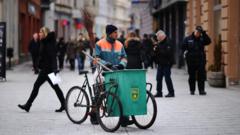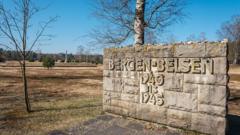More than 8,000 Bosnian men and boys were brutally killed by Bosnian Serb forces in and around Srebrenica in July 1995, a harrowing event that continues to reverberate through Bosnia and Herzegovina today. The world premiere of the play "Flowers of Srebrenica" at Sarajevo's War Theatre brings to life not only the tragic events of that summer but also the long-lasting grief and ethnic fractures that persist decades later.
The massacre of Srebrenica remains Europe’s most infamous act of genocide since World War Two. The siege, carried out as Bosniaks sought refuge under UN protection, ended in widespread murder under the command of General Ratko Mladić, who forcibly relocated women and children while orchestrating the systematic execution of the predominantly male population. In the aftermath, the bodies were buried in mass graves—only to be later disturbed in attempts to conceal the crime, resulting in families enduring a painful quest to find their loved ones' remains.
While the production is met with applause in Sarajevo, the narrative diverges sharply in Republika Srpska, where local leaders publicly dispute the genocide's historical accuracy despite international tribunals confirming it. Selma Alispahić, the lead actress and former refugee, laments the ongoing denial and the failure to acknowledge the past truthfully.
The Dayton Peace Agreement, which aimed to congeal peace just months after the massacre, only further entrenched divisions along ethnic lines, creating ethnically delineated entities. Contemporary political tensions have escalated, with Republika Srpska's president Milorad Dodik increasingly challenging national institutions and ignoring international oversight. His actions have sparked fears among communities that memories of past violence could be weaponized for political gain, and calls for increased international military support to ensure stability.
Commemorations of the Srebrenica tragedy attract significant public attention in Sarajevo, where emotional tributes are paid to the victims. Yet, just a short drive away in East Sarajevo, a stark contrast exists, with government officials dismissing the importance of remembrance and emphasizing equal accountability among all ethnic groups for crimes during the conflict.
For many, the remembrance efforts symbolize a communal path to healing. Despite rising tensions and feelings of insecurity among the survivors and their families, support for Srebrenica remains strong as individuals across the nation gather to honor those lost. As the dark clouds of manipulation and political strife continue to loom, the pursuit of reconciliation and peace remains a daunting challenge in the fabric of Bosnian society.
The massacre of Srebrenica remains Europe’s most infamous act of genocide since World War Two. The siege, carried out as Bosniaks sought refuge under UN protection, ended in widespread murder under the command of General Ratko Mladić, who forcibly relocated women and children while orchestrating the systematic execution of the predominantly male population. In the aftermath, the bodies were buried in mass graves—only to be later disturbed in attempts to conceal the crime, resulting in families enduring a painful quest to find their loved ones' remains.
While the production is met with applause in Sarajevo, the narrative diverges sharply in Republika Srpska, where local leaders publicly dispute the genocide's historical accuracy despite international tribunals confirming it. Selma Alispahić, the lead actress and former refugee, laments the ongoing denial and the failure to acknowledge the past truthfully.
The Dayton Peace Agreement, which aimed to congeal peace just months after the massacre, only further entrenched divisions along ethnic lines, creating ethnically delineated entities. Contemporary political tensions have escalated, with Republika Srpska's president Milorad Dodik increasingly challenging national institutions and ignoring international oversight. His actions have sparked fears among communities that memories of past violence could be weaponized for political gain, and calls for increased international military support to ensure stability.
Commemorations of the Srebrenica tragedy attract significant public attention in Sarajevo, where emotional tributes are paid to the victims. Yet, just a short drive away in East Sarajevo, a stark contrast exists, with government officials dismissing the importance of remembrance and emphasizing equal accountability among all ethnic groups for crimes during the conflict.
For many, the remembrance efforts symbolize a communal path to healing. Despite rising tensions and feelings of insecurity among the survivors and their families, support for Srebrenica remains strong as individuals across the nation gather to honor those lost. As the dark clouds of manipulation and political strife continue to loom, the pursuit of reconciliation and peace remains a daunting challenge in the fabric of Bosnian society.
















